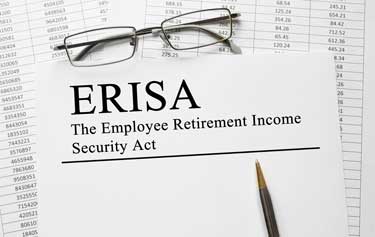What You Need to Know about ERISA Claims
If you need help, reach out to an ERISA Claims Lawyer today!
What is ERISA?

ERISA is short for the Employee Retirement Income Security Act of 1974. Congress passed the legislation in response to events in the 1960s in which large companies went out of business and were unable to pay pension benefits to their employees. Fiduciaries also mismanaged many pension plans, and Congress wanted to do something about it.
As a result, Congress passed ERISA, which set certain minimum standards that pension plans must abide by. These regulations protect retirement savings from abuse by holding administrators to a high standard of care. The legislation also covered other employee benefits plans, such as health insurance.
What does ERISA apply to?
There is a great deal of confusion about just what ERISA is. For example, some people wrongly believe that ERISA is a government insurance program. But this isn’t true. Instead, ERISA laws apply to private group benefit plans, such as:
- Health insurance
- Short-term or long-term disability
- Life insurance
- Accident death insurance
The key is “group benefit plans” offered by your insurer. You can go out on the market and buy an individual life insurance policy, but that will not be covered by ERISA because it is not a group plan offered by your employer.
Also, ERISA does not require that an employer offer a pension or other benefit plan (though other laws, like the Affordable Care Act, might require that an employer offer health insurance). Whether an employer offers a benefit is its own decision, and you can’t sue to force an employer to offer you life insurance or short-term disability, for example.
Why are ERISA protections necessary?
Historically, the insurance industry developed a reputation for unfair tactics that were meant to delay and hinder a person’s ability to receive benefits. Some of these tactics included:
- Charging a fee for a plan participant to file a claim for benefits
- Creating a cumbersome or burdensome process for claiming benefits
- Requiring numerous internal appeals, in the hopes that a plan participant will give up and stop seeking compensation
ERISA was designed to prevent the worst abuses. By passing a federal law, employees would not need to rely solely on state laws, which were patchy and not always friendly to workers. Indeed, ERISA preempts most state laws related to employee benefits.
What began as a law designed to shore up the nation’s pension system is now a powerful tool for workers who feel that they have been denied any employment benefit. If you succeed in your ERISA claim, you can have benefits reinstated, or you might also receive other relief. In some situations, you can receive attorneys’ fees, which makes hiring an experienced ERISA lawyer affordable.
ERISA terms
Here are some terms you will need to help you understand the rest of this guide:
- Plan: this is the group employee benefit plan offered by your employer.
- Plan participant: this is the person whose name is on the policy as the participant.
- Plan administrator: this is the person or organization that administers the plan and decides whether to grant or deny benefits.
Because ERISA is a federal law, claims can be brought in federal court. However, your ability to sue is limited in important ways, which we will deal with later.
Contact me today!
If you need help with an ERISA claim, contact The Peace Law Firm today!
